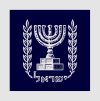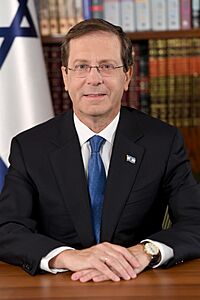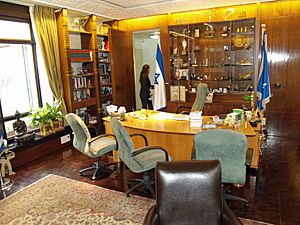President of Israel facts for kids
Quick facts for kids President of the State of Israel |
|
|---|---|

Presidential standard
|
|
| Style | His Excellency |
| Residence | Beit HaNassi |
| Appointer | Knesset |
| Term length | Seven years,
non renewable
|
| Constituting instrument | Constitution of Israel (1950) |
| Inaugural holder | Chaim Weizmann |
| Formation | 16 February 1949 |
| Deputy | Speaker of the Knesset |
| Salary | US$173,255 annually |
| Website | Israel presidential website |
The President of the State of Israel (Hebrew: נְשִׂיא מְדִינַת יִשְׂרָאֵל, romanized: Nesi Medinat Yisra'el) is the head of state of Israel. This role is mostly ceremonial. The real executive power belongs to the cabinet, which is led by the prime minister. The current president is Isaac Herzog, who started his term on July 7, 2021. Presidents are chosen by the Knesset for one seven-year term.
Contents
Choosing the President of Israel
The President of Israel is elected by the Knesset, which is Israel's parliament. The election uses a secret ballot system. A candidate needs more than half of the votes to win. If no one gets enough votes in the first two rounds, the candidate with the fewest votes is removed. This continues until only two candidates are left.
Term Length and Eligibility
From 1949 to 2000, presidents served five-year terms. They could be elected up to two times. Since 2000, the president serves a single seven-year term. This change helps ensure the president remains neutral. Any Israeli citizen can run for president. There is no minimum age requirement.
When the Office Becomes Empty
The president's job can become empty in a few ways. This happens when a term ends, if the president resigns, or if the president passes away. The Knesset can also remove a president if three-quarters of its members agree. This would happen if the president cannot do their job or acts improperly.
Israel does not have a vice president. If the president is temporarily unable to serve, the speaker of the Knesset takes over as acting president.
History of Presidential Elections
The very first presidential election in Israel happened on February 16, 1949. Chaim Weizmann was the winner. The second election was in 1951. Another election took place in 1952 after Weizmann passed away.
Since then, elections have been held regularly. Some elections, like those in 1951, 1957, 1962, 1968, 1978, and 1988, had only one candidate. Even then, a vote was still held. Isaac Herzog was elected as the 11th President on June 2, 2021. His term began on July 9, 2021.
President's Powers and Duties
The president's main job is to represent the State of Israel. This means representing the country abroad and helping to unite people at home. The president is a symbol of the Israeli state. They approve decisions made by the government and ensure the public's wishes are carried out.
The president's powers are similar to those of heads of state in other parliamentary democracies. These powers are mainly set out in a law called Basic Law: The Presidency, passed in 1964. Another law, Basic Law: The Government, also explains the president's role in forming a government.
Unlike leaders in many other countries, the president is not the main executive leader. The executive power is held by the Government, led by the prime minister. Most of the president's actions need the prime minister's approval to become legal. This means the president's role is mostly ceremonial. However, the president does have some special powers they can use on their own.
The president has special protection from lawsuits and criminal charges. This means they cannot be sued or charged for things they do as part of their official duties. This protection helps the president stay independent from other parts of the government. It allows them to influence politics in a neutral way. They also help ensure the government runs smoothly and talk to the public about important national issues.
Everyday Tasks of the President
The president signs new laws passed by the Knesset. They also approve international agreements that the Knesset has agreed to. The president officially approves Israeli ambassadors who go to other countries. They also welcome foreign diplomats who come to Israel.
The president appoints many important public officials. These include judges, the head of the Bank of Israel, and leaders of various national organizations. Judges are appointed based on recommendations from a special committee. Other appointments are made based on the government's advice.
Special Powers of the President
Besides routine tasks, the president has special powers. These include forming the government, dissolving the Knesset, and granting pardons. These are called the president's "reserve powers."
Forming the Government
One of the president's most important powers is leading the process of forming a government. After each election, the president talks with leaders of different political parties. They try to figure out who can get enough support to lead the Knesset. Then, the president asks a member of the Knesset to try and form a government. If that person succeeds and the Knesset approves, they become the prime minister. If they fail, the president asks someone else. If a government isn't formed within a certain time, the president can dissolve the Knesset and call for new elections.
Ending the Knesset's Term
The prime minister can ask the president to dissolve the Knesset. This usually happens if the government has lost its majority support. The president can say no to this request. If the president refuses, it can lead to the prime minister resigning. This power helps prevent a prime minister from misusing their authority.
Presidential Pardons
The president has the power to pardon people. This means they can reduce or cancel sentences for both soldiers and civilians. They can also refuse these requests. The president makes these decisions on their own. They get information from the people asking for pardons and talk with the Minister of Justice or the Minister of Defense. Each president handles pardons in their own way.
Other Presidential Activities
The president gives out special honors, like the Righteous Among the Nations award. They also present the Wolf Prize and the Presidential Medal of Honor. The president helps award the Israel Prize every year on Yom Ha'atzmaut. They also give speeches at the opening of Knesset meetings and at important national ceremonies for Yom Hazikaron (Memorial Day) and Yom HaShoah (Holocaust Remembrance Day).
Backgrounds of Israeli Presidents
Most Israeli presidents were involved in national politics or Zionist activities before becoming president. Some were also famous in other fields. For example, Chaim Weizmann was a top chemist. He founded the Weizmann Institute of Science. Zalman Shazar was an author, poet, and journalist. Chaim Herzog was a military leader, lawyer, and diplomat.
The first Israeli presidents were born in the former Russian Empire. Yitzhak Navon was the first president born in Israel and the first with a Sephardi background. Chaim Herzog was the first president from Western Europe, originally from Belfast, United Kingdom. Moshe Katsav was the first president with a Mizrahi background, born in Iran.
Isaac Herzog is the first president born in the modern State of Israel after its independence. He is also the first son of a former Israeli president to become president himself. As of 2025, the only other presidents with close family ties were Chaim Weizmann and his nephew Ezer Weizman.
Political Connections
Many early Israeli presidents were connected to the Labor Party. They were often seen as politically moderate. Moshe Katsav was the first president from the Likud party. In 1978, Yitzhak Navon from the Labor Party was elected. He was the first president of Sephardi origin. Many people felt he brought unity to Israel during a time of political change. In 1983, Navon returned to Labor politics. Chaim Herzog then became the sixth president. In 2000, Moshe Katsav (Likud) won against Shimon Peres (Labor) in a surprise election.
Albert Einstein, a famous scientist, was offered the presidency in 1952. He was Jewish but not an Israeli citizen. He turned down the offer, saying he was better at dealing with science than with people and official duties.
See also
 In Spanish: Presidente de Israel para niños
In Spanish: Presidente de Israel para niños
 | Frances Mary Albrier |
 | Whitney Young |
 | Muhammad Ali |



